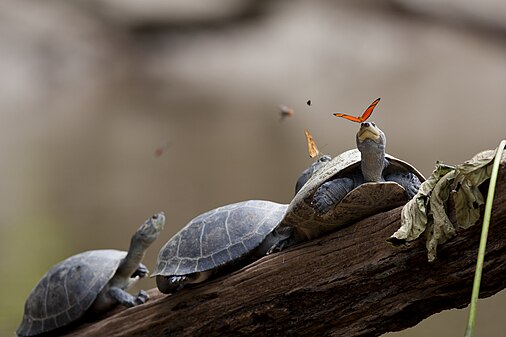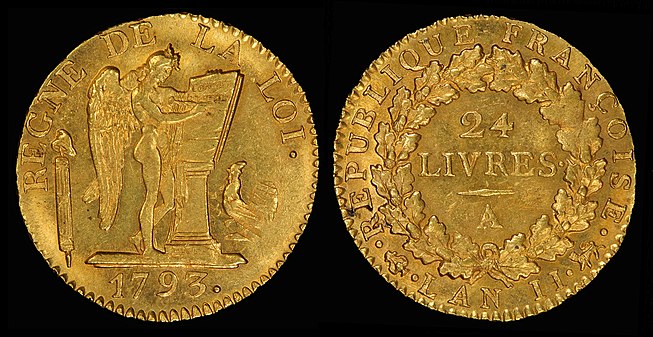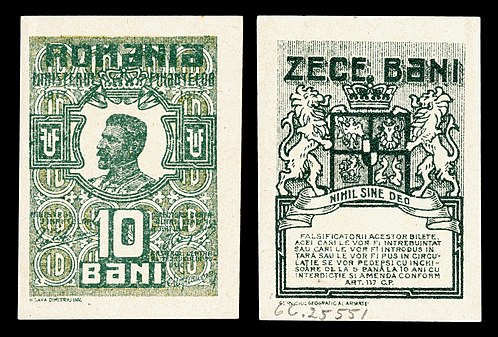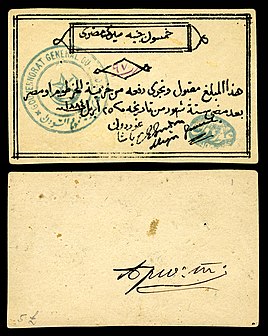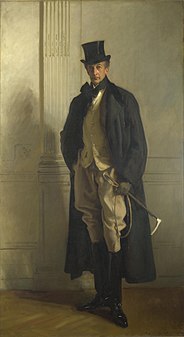Wikipedia:Wikipedia Signpost/Single/2015-10-28
The Signpost's reorganization plan—we need your help
English Wikipedia reaches five million articles
The English Wikipedia reached five million articles on November 1 with the article Persoonia terminalis, a shrub native to eastern Australia. The article was created by Cas Liber, an Australian Wikipedian who has been editing since 2006. He has created and edited a number of Featured Articles on similar topics and is active in projects like WikiProject Fungi and WikiProject Plants. Liber was one of a number of editors submitting articles around the same time to try to hit the milestone. He wrote "I tried to pick articles I could get to FA status at some point...to show the world that we could FAC the 5000000th." No free image of Persoonia terminalis is currently available, but a number of Wikipedians have independently contacted an Australian photographer who posted copyrighted images of the shrub's two subspecies to Flickr.
The event has been marked by a Wikimedia blog post and a letter from the community, which is reproduced here.
| Previous milestones | Date | Article |
|---|---|---|
| 1 million | 1 March 2006 | Jordanhill railway station |
| 2 million | 9 September 2007 | El Hormiguero |
| 3 million | 17 August 2009 | Beate Eriksen |
| 4 million | 13 July 2012 | Ezbet el-Borg |
The world's Wikipedia gaps; Google and Wikipedia accused of tying Ben Carson to NAMBLA
A decade ago, Nkandla was the setting of an award-winning documentary, The Orphans of Nkandla, which resulted in the creation of The Africa Project. It is a matter of record that AIDS and poverty have ravaged many children's lives in KwaZulu-Natal. But Hay's observation about minor language versions of Wikipedia remains broadly correct. Indeed, a slide shown at Wikimania 2014 indicated that of Wikipedia's then-284 (today: 291) language versions,
- 12 were dead (locked);
- 53 were "zombies" (open, no editors);
- 94 were struggling (open, fewer than 5 editors);
- 125 were "in good or excellent health" (presumably, judging by the definitions of the previous three categories, this number included all Wikipedias that had 5 or more editors).
The implications for quality are obvious.
Deploring Wikipedia's "cumbersome self-created bureaucracy and inter-editor sniping", Hay suggests that these global imbalances are unlikely to right themselves: while it may be tempting to think that the more established Wikipedias are bigger and more developed merely because they had several years' head start on smaller language versions, the smaller language versions show no sign of replicating the extraordinary boom the English Wikipedia underwent in its early years. In fact, Hay argues, the global volunteer base shrank by a third between 2007 and 2013.
| “ | The whole situation can feel a little futile – a depressing reaffirmation of entrenched inequalities born out of what was supposed to be an accessible, egalitarian, and idealistic site. | ” |
Hay then proceeds to place his hopes in auto-translation apps, and reviews two multilingual projects:
- Omnipedia, a project being developed by researchers at Northwestern University, "capable of culling, comparing, and automatically translating data from 25 different Wikipedia language editions simultaneously, presenting them in simplified form", and
- Manypedia, an Italian project, online today, that "can automatically translate two Wikipedia articles side by side and point out incongruous information between them – or just translate an existing article into a different language".
Hay suggests that "complementary data from across all the world's Wikipedias" could be mined and translated "back to your native language site, thus attaining the online encyclopedia's egalitarian ideal". This is an overly optimistic view, given the present day's appalling, practically unreadable quality of many machine translations, which would leave prospective readers of Wikipedias stocked with machine translations profoundly frustrated – a point that can be verified by looking at some of Manypedia's article translations.
The English translation of the Persian article on "Third World" for example (enter http://www.manypedia.com/#!|en|Third_World|fa as the URL and click "Translate" in the right-hand panel) includes gems like
| “ | Definition
In academic circles, the term South, developed and underdeveloped third world countries used to refer to. |
” |
Imagine a Zulu reader trying to learn about physics or chemistry from a text that is as proficiently authored in Zulu as the above passage is clear and concise English.
There is little reason to argue with Hay's conclusion, however:
| “ | At the very least, if these initiatives gain a bit of traction, they can start a serious conversation about continued shortcomings and differences between Wikipedias, driving us toward more systematic changes and tactics that can fill the world's glaring content gaps once and for all. | ” |
AK
Google and Wikipedia accused of tying Ben Carson to NAMBLA
Breitbart accuses (Oct. 27) Wikipedia and Google of having prominently linked the name of Ben Carson, an acclaimed pediatric neurosurgeon and a Republican candidate for President of the United States in the 2016 presidential election, to a pedophile advocacy group, the North American Man-Boy Love Association (NAMBLA).
As evidence Breitbart shows a screenshot of a Google search results page, which lists Carson's Wikipedia biography as the top result (below the sponsored link and the "In the news" section), with "North American Man-Boy Love", "Seventh-day Adventist Church" and "Craniopagus twins" highlighted as hyperlinked key points in blue.
A Carson campaign spokesperson told Breitbart,
| “ | We've complained to Google and filled out requests to take it down that have been ignored. | ” |
The spokesman blamed "pranksters" for the inappropriate highlight.
NAMBLA is mentioned in Wikipedia's biography of Carson because the term occurs in a 2013 comment of Carson's that is quoted verbatim in the article, and in which Carson said, "Marriage is between a man and a woman. No group, be they gays, be they NAMBLA, be they people who believe in bestiality, it doesn’t matter what they are. They don’t get to change the definition." (Carson subsequently apologized for the remark.) The acronym NAMBLA in the quotation has from time to time been hyperlinked in the Wikipedia article.
While the Carson team's frustration with the Google entry is understandable, it seems speculative to suggest that the hyperlink must have been placed so as to increase the term's chances of appearing in the Google snippet, or that Google staff specifically selected the term to appear in its snippet from the many available.
It bears mention though that according to Wikipedia's manual of style, quotations should generally remain free of hyperlinks. At the time of writing, the Google snippet no longer references NAMBLA. AK
- EFF comments on NSA lawsuit: The Electronic Frontier Foundation has published a critical comment (Oct. 29) on the recent dismissal of the Wikimedia Foundation v. NSA lawsuit (see previous Signpost coverage). AK
- Follow-up to the Atlantic story: Women’s fashion and lifestyle website Verily covers (Oct. 28) last week's story in The Atlantic on "Wikipedia's hostility to women" (see coverage in the previous Signpost issue and the related, much-discussed Signpost editorial). Going beyond a mere summary of the Atlantic article, the piece argues that "Not only does anonymity give some Internet users the evil courage to spew vitriol, but it can sometimes lead to victim blaming as well." A Korean site also picked up the story. AK
- Why the arts need to fix Wikipedia: ArtsHub discusses (Oct. 28) Wikipedia's Art+Feminism initiative along with the work museums are doing to fill content gaps in Wikipedia. AK
- Debunking Wikipedia conspiracy theories: In the September/October issue of Skeptical Inquirer, Susan Gerbic, co-founder of Guerrilla Skepticism on Wikipedia, writes (Oct. 28) "Is Wikipedia a Conspiracy? Common Myths Explained", where she discusses common misconceptions in the skeptical community about Wikipedia. G
- Lack of media attention to Wikipedia: VentureBeat (Oct. 26) and The Next Web (Oct. 27) pick up on a recent Signpost editorial by Signpost editor-in-chief Gamaliel that was republished in a slightly edited version on the Wikimedia blog, arguing that Wikipedia receives remarkably little press attention compared to other top-ten sites. Both The Next Web and VentureBeat agree that the post raised a valid point; The Next Web suggests that the "all-too-silent Wikimedia Foundation is partly to blame". Gamaliel clarified in a reader comment at The Next Web that he would like to see more investigative journalism in the media's Wikipedia coverage, as opposed to a reliance on Wikimedia press releases. AK
- Wikipedia Monument celebrates first anniversary: Inverse.com marks (Oct. 22) the first anniversary of the world’s first and only monument in tribute to Wikipedia in Słubice, Poland. The bronze sculpture cost $14,000. Krzysztof Wojciechowski, a Polish professor, felt deep gratitude for the contributions of Wikipedia and its editors to shared knowledge, leading him to suggest the monument to the town's administration. L
It’s time to stop the bullying
A second attempt at Arbitration enforcement
Canada, the most popular nation on Earth

Elsewhere on the chart, the coming of Star Wars: The Force Awakens, which still doesn't happen until December, took up two slots in the Top 10. A new age-titled album from singer Adele placed #7, and the Top 10 was rounded out by a Reddit thread about a rare disease, and the stalwart Deaths in 2015.
For the full top-25 list, see WP:TOP25. See this section for an explanation of any exclusions. For a list of the most edited articles of the week, see here.
For the week of October 18 to 24, 2015, the ten most popular articles on Wikipedia, as determined from the report of the most viewed pages, were:
Rank Article Class Views Image Notes 1 Justin Trudeau 
2,709,956 
Trudeau is expected to soon take over as Prime Minister of Canada following the success of his Liberal Party in the recent Canadian federal election. Trudeau's father Pierre Trudeau (#4) served in that role from 1968-1984 (with a brief break in 1979-80). With over 2.7 million views for the week, this was quite a popular event. To some unknown extent, the article's views were inflated by widespread press coverage about the subject's attractiveness, both pro and con. 2 Star Wars: The Force Awakens 
1,271,270 
If you've caught the press coverage about this upcoming movie here and there, you may be asking yourself, is this thing ever coming out? A poster and new trailer was released last week, which apparently caused a frenzy on the part of the internet not ogling the force of Justin Trudeau. And for those us not that closely involved, the answer is that it rolls out in parts of Europe on December 16, the U.K. on December 17, and North America on December 18. 3 Michael J. Fox 
933,448 
October 21, 2015 was "Back to the Future Day" – the day in the future that Marty McFly (played by Fox) traveled to in the 1989 film Back to the Future Part II. And though we don't have true hoverboards or a Jaws 19 movie, and the Chicago Cubs just missed their chance to make it to the World Series, the Internet nostalgia engine was running out of control. And with fathers and son Trudeau, the appearance of the Canadian born Fox means that Canada, the 37th most populated country in the world, has placed three of the top five articles this week, a feat unlikely to ever be repeated. 4 Pierre Trudeau 
860,884 
Ranked by scholars as one of the greatest Canadian prime minsters, and also the slightly less attractive forebear of this week's #1. 5 Back to the Future 
767,683 
See #3, # 11, and #15. 6 Black hole 
612,175 
Up from #13 last week, but a debatable entry. The first entry without 1970/80s roots, as the 1979 Disney film The Black Hole simply does not generate that much warm nostalgia. Though a Reddit thread could lift an article like this into the Top 10 on any given week, we do not see any such thread. Stats.grok.se shows a jump in views starting on October 13 from a few thousand per day to over 40,000 per day. It has 25% mobile views (not the either 0% or 99% typical of bot-view popularity), but we may drop this from the list if these steady views continue and a human-based explanation cannot be found. 7 Adele 
581,472 
The popular singer's new album 25 will be released on November 20. The first single, "Hello", debuted on October 23. As of this writing, the video for "Hello" already has 73 million views. 8 Star Wars 
567,518 
See #2. 9 Fibrodysplasia ossificans progressiva 
545,423 October 24 saw the most interest in this article, generated by a Reddit thread that stated "[today I learned] that there is a disease that makes the body repair injuries using bone, over the course of many years, this leads to the victim becoming more and more like a statue." Non-sensational headlines like this actually can get attention on Reddit; they don't need to use clickbait thread titles like "Feeling lethargic today? Find out if rare disease may be turning you into stone!" 10 Deaths in 2015 
535,526 
The viewing figures for this article have been remarkably constant; fluctuating week to week between 450 and 550 thousand on average, apparently heedless of who actually died. Deaths this week included NASA specialist Robert W. Farquhar whose projects included the first probe to intercept a comet in 1985 (October 18); Miss Austria 2013 Ena Kadić, who died from injuries sustained from falling off a mountain (October 19); Polish-Austrian economist Kazimierz Łaski, a leading proponent of Post-Keynesian economics (October 20, pictured); Pakistani cricket manager Yawar Saeed (October 21); Former Mexican senator Tomás Torres Mercado, who died in a plane crash (October 22); Croatian chess grandmaster Krunoslav Hulak (October 23); and 20-year-old British charity fundraiser Kirsty Howard (October 24).
- See the WP:TOP25 for entries 11-25.
- Just Missing the Top 25 This Week: #26 Steve Jobs; #27 List of Bollywood films of 2015; #28 Ross Rebagliati (another Canadian); #29 The Walking Dead (TV series); #30 The Walking Dead (season 6); #31 The Martian (film); #32 Stephen Hawking; #33 Hell in a Cell (2015) (wrestling pay-per-view event); #34 United States; #35 Pyaar Ka Punchnama 2 (Hindi film)
- From the Raw WP:5000: #100 Curse of the Billy Goat (a Chicago Cubs reference; 198,382 views); #250 The Voice (U.S. season 9) (119,156 views); #500 Asperger syndrome (87,696 views); #1000 Gone Girl (film) (62,167 views); #2500 Julianne Moore (37,345 views)
Student attitudes towards Wikipedia; Jesus, Napoleon and Obama top "Wikipedia social network"; featured article editing patterns in 12 languages
A monthly overview of recent academic research about Wikipedia and other Wikimedia projects, also published as the Wikimedia Research Newsletter.
- "607 Journalists: An evaluation of Wikipedia’s response to and coverage of breaking news and current events"[6] See also blog post
- "Wiki is not paper: Fixing and breaking the 'news' on Wikipedia"[7] From the abstract: "The case studies include the "Barack Obama" article, which is used to investigate the establishment and maintenance of the "fact" that Obama is described as an 'African American,' despite his mixed-race heritage. ... The second case study uses the article on the 2008 war in the Georgian province of South Ossetia to investigate the transnational and transcultural pitfalls of 'bias' in the writing of a 'neutral' article. The final case examines the decision to publish controversial material by examining the article on the 2006 Muhammad cartoons controversy. This article was crucial on Wikipedia in establishing the protocol in publishing such images."
- "User interaction with community processes in online communities"[8] From the abstract: "We find that articles that are deleted from Wikipedia differ from those that are not in many significant ways. We also find, however, that most deleted articles are deleted extremely hastily, often before they have time to develop. We use our data to create a model that can predict with high precision whether or not an article will be deleted. ... We propose to deploy a system utilizing this model on Wikipedia as a set of decision-support tools to help article creators evaluate and improve their articles before posting. ... English Wikipedia’s Articles for Creation provides a protected space for drafting new articles, which are reviewed against minimum quality guidelines before they are published. We explore the possibility that this drafting process, which is intended to improve the success of newcomers, in fact decreases newcomer productivity in English Wikipedia, and offer recommendations for system designers."
- "Detecting Vandalism on Wikipedia across Multiple Languages"[9]
- More recent publications
- "Spillovers in Networks of User Generated Content: Pseudo-Experimental Evidence on Wikipedia"[10] From the abstract: "[On the German Wikipedia, the featuring of an article on the main page does] affect neighboring articles substantially: Their viewership increases by almost 70 percent. This, in turn, translates to increased editing activity. Attention is the driving mechanism behind views and short edits. Both outcomes are related to the order of links, while more substantial edits are not." See also by the same author: "Spillovers in Networks of User Generated Content"
- "Peer Effects in Collaborative Content Generation: The Evidence from German Wikipedia"[11] From the abstract: "editors who contribute to the same articles and exchange comments on articles’ talk pages work in collaborative manner sometimes discussing their work. They can, therefore, be considered as peers, who are likely to influence each other. In this article, I examine whether peer influence, measured by the average amount of peer contributions or by the number of peers, yields spillovers to the amount of individual contributions."
- "Wikipedia Page View Reflects Web Search Trend""[12] (see also datasets, slides) From the abstract: "We found frequently searched keywords to have remarkably high correlations with Wikipedia page views."
- "Wikipedia edition dynamics"[13] From the abstract: "It is argued that the probability to edit is proportional to the editor's number of previous editions (preferential attachment), to the editor's fitness and to an ageing factor." See also by the same authors: "The dynamic nature of conflict in Wikipedia"
- "Cultural Similarity, Understanding and Affinity on Wikipedia Cuisine Pages"[14] See also "Mining cross-cultural relations from Wikipedia - A study of 31 European food cultures"
- "The influence of network structures of Wikipedia discussion pages on the efficiency of WikiProjects"[15] From the abstract: "The evaluation suggests that an intermediate level of cohesion with a core of influential users dominating network flow improves effectiveness for a WikiProject, and that greater average membership tenure relates to project efficiency in a positive way."
- "Technological Nudges and Copyright on Social Media Sites"[16] From the abstract: "Using an adapted taxonomy, this article identifies the technological features on predominant social media sites—Facebook, YouTube, Twitter and Wikipedia—that encourage and constrain users from engaging in generative activities. Notwithstanding the conflicting narrative painted by recent litigation around copyright in relation to content on social media sites, I observe that some of the main technological features on social media sites are designed around copyright considerations." (However, the paper never mentions that Wikipedia's content is under a free license.) "In contrast to the other social media sites, I note that Wikipedia does not allow its users to comment on content; hence there is little room for this alternative form of modification."
- "The WikEd Error Corpus: A Corpus of Corrective Wikipedia Edits and Its Application to Grammatical Error Correction"[17]
- "Students' use of Wikipedia as an academic resource — Patterns of use and perceptions of usefulness"[18] (survey of 1658 undergraduate students) From the abstract: "87.5% of students report using Wikipedia for their academic work, with 24.0% of these considering it ‘very useful’. Use and perceived usefulness of Wikipedia differs by students’ gender; year of study; cultural background and subject studied. Wikipedia mainly plays an introductory and/or clarificatory role in students information gathering and research."
- "Snooping Wikipedia Vandals with MapReduce"[19] From the abstract: "[Using] MapReduce ... we are able to explore a very large dataset, consisting of over 5 millions articles [actually pages on enwiki, including non-articles] collaboratively edited by 14 millions authors, resulting in over 8 billion pairwise interactions. We represent Wikipedia as a signed network, where positive arcs imply constructive interaction between editors. We then isolate a set of high reputation editors (i.e., nodes having many positive incoming links) and classify the remaining ones based on their interactions with high reputation editors."
- "An agent-based model of edit wars in Wikipedia: How and when consensus is reached"[20] From the abstract: "We show that increasing the number of credible or trustworthy agents and agents with a neutral point of view decreases the time taken to reach consensus, whereas the duration is longest when agents with opposing views are in equal proportion." See also last issue's review of a different numerical model of edit wars: "More newbies mean more conflict, but extreme tolerance can still achieve eternal peace"
References
- ^ Blikstad-Balas, Marte (2015). ""You get what you need" : A study of students' attitudes towards using Wikipedia when doing school assignments". Scandinavian Journal of Educational Research. 3831 (October): 1–15.

- ^ Johanna Geiß, Andreas Spitz, Michael Gertz: Beyond Friendships and Followers: The Wikipedia Social Network PDF
- ^ Park Sung Joo, Kim Jong Woo, Lee Hong Joo, Park Hyunjung, Han Deugcheon, and Gloor Peter.
Exploration of Online Culture Through Network Analysis of Wikipedia. Cyberpsychology, Behavior, and Social Networking, ahead of print. doi:10.1089/cyber.2014.0638

- ^ Hamiti, Mentor; Susuri, Arsim; Dika, Agni. "Machine Learning and the Detection of Anomalies in Wikipedia" (PDF). Proceedings of the 19th International Conference on Circuits, Systems, Communications and Computers.
- ^ de La Robertie, Baptiste; Pitarch, Yoann; Teste, Olivier. "Measuring Article Quality in Wikipedia Using the Collaboration Network" (PDF).
- ^ Joseph R. B. Sutherland: 607 Journalists: An evaluation of Wikipedia’s response to and coverage of breaking news and current events. Dissertation, Aberdeen Business School - Robert Gordon University, April 2015 PDF
- ^ Lyons, J. Michael: Wiki is not paper: Fixing and breaking the "news" on Wikipedia. Dissertation, Indiana University, 2015, 206 pages; [1]

- ^ Gelley, Shoshana Bluma. User interaction with community processes in online communities. Dissertation, Polytechnic Institute of New York University, 2015 [2]

- ^ Khoi-Nguyen Dao Tran: Detecting Vandalism on Wikipedia across Multiple Languages. Thesis submitted for the degree of Doctor of Philosophy, The Australian National University, May 2015 PDF
- ^ Kummer, Michael E. (2014-12-29). Spillovers in Networks of User Generated Content: Pseudo-Experimental Evidence on Wikipedia. Rochester, NY: Social Science Research Network. SSRN 2567179.
- ^ Olga Slivko: Peer Effects in Collaborative Content Generation: The Evidence from German Wikipedia. Discussion Paper No. 14-128, Centre for European Economic Research (ZEW). December 22, 2014, updated March 3, 2015 PDF
- ^ Mitsuo Yoshida, Yuki Arase, Takaaki Tsunoda, Mikio Yamamoto. Wikipedia Page View Reflects Web Search Trend. The 2015 ACM Web Science conference (WebSci15). Oxford, UK, June 28 - July 1, 2015. Authors' copy
- ^ Gandica, Y.; F. Sampaio dos Aidos; J. Carvalho (2014-12-30). "Wikipedia edition dynamics". arXiv:1412.8657.
- ^ Paul Laufer: Cultural Similarity, Understanding and Affinity on Wikipedia Cuisine Pages. Master Thesis, TU Graz, August 2014 PDF
- ^ Xiangju Qin, Pádraig Cunningham, Michael Salter-Townshend: The influence of network structures of Wikipedia discussion pages on the efficiency of WikiProjects. Social Networks Volume 43, October 2015, Pages 1–15 doi:10.1016/j.socnet.2015.04.002

- ^ Tan Ms, Corinne (2015). "Technological Nudges and Copyright on Social Media Sites". Intellectual Property Quarterly (1): 62–78.
- ^ Grundkiewicz, Roman; Junczys-Dowmunt, Marcin (2014-09-17). "The WikEd Error Corpus: A Corpus of Corrective Wikipedia Edits and Its Application to Grammatical Error Correction". In Adam Przepiórkowski; Maciej Ogrodniczuk (eds.). Advances in Natural Language Processing. Lecture Notes in Computer Science. Springer International Publishing. pp. 478–490. ISBN 978-3-319-10888-9.

- ^ Neil Selwyna, Stephen Gorardb: Students' use of Wikipedia as an academic resource — Patterns of use and perceptions of usefulness. The Internet and Higher Education, Volume 28, January 2016, Pages 28–34 doi:10.1016/j.iheduc.2015.08.004

- ^ Michele Spina, Dario Rossi, Mauro Sozio, Silviu Maniu, Bogdan Cautis: Snooping Wikipedia Vandals with MapReduce. 2015 IEEE International Conference on Communications (ICC), doi:10.1109/ICC.2015.7248477. PDF (authors' copy)
- ^ Arun Kalyanasundaram, Wei Wei, Kathleen M. Carley, James D. Herbsleb: An agent-based model of edit wars in Wikipedia: How and when consensus is reached. Proceedings of the 2015 Winter Simulation Conference, L. Yilmaz, W. K V. Chan, I. Moon, T. M. K. Roeder, C. Macal, and M. D. Rossetti, eds. PDF.
Birds, turtles, and other things

Featured articles

Eight featured articles were promoted this week.
- Boletus aereus (nominated by Sasata and Casliber)
- Boys Don't Cry (film) (nominated by Johanna)
- Horse-fly (nominated by Cwmhiraeth)
- Life's Shop Window (nominated by Squeamish Ossifrage)
- Maniac Mansion (nominated by JimmyBlackwing)
- Mantis (nominated by Chiswick Chap, LittleJerry, and Cwmhiraeth)
- Perijá tapaculo (nominated by Thine Antique Pen)
- Tyrone Garland (nominated by TempleM)
Featured lists
One featured lists were promoted this week.
Featured pictures
- (created and nominated by User:Crisco 1492)
- (created by the National Bank Note Company; nominated by User:Godot13)
- (created by the National Bank Note Company; nominated by User:Godot13)
- (created by the National Bank Note Company; nominated by User:Godot13)
- (created by the National Bank Note Company; nominated by User:Godot13)
- (created by the National Bank Note Company; nominated by User:Godot13)
Tech news in brief
Five million articles
The English Wikipedia has reached 5,000,000 articles with
Persoonia terminalis (a type of shrub),
created by Australian contributor Cas Liber on 1 November 2015 at 12:27 UTC.

Imagine a world in which every single person on the planet is given free access to the sum of all human knowledge. That's what we're doing.
— Jimmy Wales, co-founder
Wikipedia was founded in 2001 as a project to build an online, free-access, free-content encyclopedia entirely from scratch. Since then, it has grown to be the largest encyclopedia ever created, comprising more than five million articles in English, while still relying on the contributions of volunteers. The English Wikipedia community thanks the millions of users whose edits over the past fourteen-plus years have made this remarkable accomplishment possible.
A brief history
Wikipedia officially launched on 15 January 2001, with Jimmy Wales and Larry Sanger as its leaders, on a single computer server as the successor to Nupedia. Its first major mainstream media coverage was in The New York Times on 20 September 2001. In the first year of its existence, more than 20,000 encyclopedia entries were created – a rate exceeding 1,500 articles per month. Today, there are Wikipedia editions in more than 200 languages, accompanied by a dozen additional free-content projects, such as Wikimedia Commons. In March 2006, the English Wikipedia reached one million articles. According to Alexa, Wikipedia is currently the world's sixth most popular website, receiving approximately eight billion pageviews per month. We reached five million articles on 1 November 2015.
A work in progress

While Wikipedia is an incredible success, it remains a work in progress. There are still great gaps in its coverage with millions of important topics missing from its pages. Many articles – even vital ones – are not yet considered high-quality. Of our five million articles, only a few tens of thousands have passed a vetting process for good or featured status, and more than half are short stubs or start-class articles. There are also more than 200 non-English-language editions of Wikipedia that need volunteers. In other words, there is still much work to be done – and you can help!
How you can help
Wikipedia is written by the people who use it. Anyone, regardless of background, can contribute to building the encyclopedia. You don't even have to register an account (though there are good reasons to do so). If you find an article you can improve, edit the article to make it more accurate and useful for others. Each page contains edit buttons for you to make those changes immediately. Any improvement, whether it's fixing a typo or drafting a brand new article, is greatly appreciated.
Wikipedia values boldness and the pursuit of consensus. Don't be afraid or disillusioned if your first contributions are undone – Wikipedia is a collaborative project, which means that sometimes we disagree. That's okay. Each page on Wikipedia has a talk page dedicated to discussing improvements, and fellow editors have a talk page where you can contact them individually.
Welcome
If you're new here, firstly: welcome. We sincerely hope you like it here and decide to stay. Below are some helpful links to get you started:
- Five pillars of Wikipedia – the fundamental principles that guide our decision-making
- Research help – Strategies for utilizing Wikipedia's knowledge
- Tutorial – a simple nine-page guide on the basics of Wikipedia editing
- The Wikipedia Adventure – an interactive one-hour tour that will help you engage in the basics of editing
- Contributing to Wikipedia – a one-hour comprehensive outline of the basics of contributing
If you want to find an article to improve, here are some pointers and areas to contribute:
- Wikipedia:Community portal – collaborations, tasks, and news about the English Wikipedia
- Wikipedia:WikiProject Council/Directory – A directory of WikiProjects, which are groups of editors working to improve articles within each project's scope
- Wikipedia:Vital articles – Topics on which the English Wikipedia should have corresponding high-quality articles
- This week's article for improvement is Gulf
If you get stuck, a variety of resources are available to assist you. The page Wikipedia:Questions lists locations where you can ask for help. The most valuable assets, however, are your fellow Wikipedians. If you have any questions about editing Wikipedia, friendly Wikipedians at the Teahouse will be more than happy to provide answers. You can also meet Wikipedians in person in many places around the world; see Wikipedia:Meetup for more information.
If you are already a Wikipedian, thank you for your contributions. We hope you continue to contribute to this amazing compendium of human knowledge.
Sincerely,
The Wikipedia community
- Wikimedia Australia presentation for the Australian Library and Information Association, 2014
- Wikimedia India meetup in Bangalore, 2015
- WikiConference USA in Washington, D.C. at the U.S. National Archives building, 2015
Press contacts
Members of the press may contact the following for comments:
- Wikimedia Australia
- Wikimedia Canada
- Cascadia Wikimedians User Group (US and Canada)
- Wikimedia District of Columbia (US)
- Wikimedia Hong Kong
- Wikimedia India
- Wikimedia Community Ireland
- Wikimedia New York City (US)
- Wikimedia User Group Nigeria
- Wikimedia Pakistan
- Wikimedia Philippines
- Wikimedia South Africa
- Wikimedia UK
- Wiki Learning Tec de Monterrey (Mexico)
- The Wikimedia Foundation (hosts Wikipedia's technical infrastructure, and provides legal and financial services)








